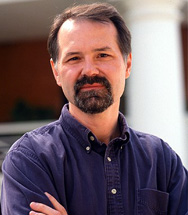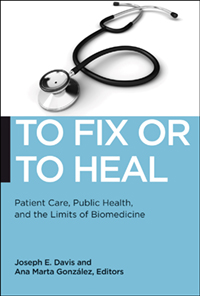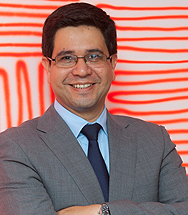Patient care, public health and the limits of biomedicine.
Social Trends Institute interviews Joseph E. Davis, partner of project 'Emotional culture and identity' of ICS, on the occasion of the new book 'To Fix or to Heal', which he co-edited with Ana Marta González.

Ana Marta Gonzalez and Joseph E. Davis, researcher and partner of the project 'Emotional culture and identity' of the Institute for Culture and Society (ICS), which is funded by Zurich Insurance, are co-editors of the book To Fix or To Heal. Patient Care, Public Health, and the Limits of Biomedicine.
Throughout the essays he collects on patient care, public health and the limits of medicine, Issue advocates humanizing medical practices to respond to the social and environmental aspects of health and illness, as well as the individual.
On the occasion of the publication of the book, the research center Social Trends Institute has interviewed Joseph E. Davis, Professor of Sociology and director of research of high school of programs of study Advanced in culture at the University of Virginia (USA).
 The degree scroll of the book is 'To Fix or to Heal?: Patient Care, Public Health, and the Limits of Biomedicine'. What choice is implicit in the phrase 'fix or cure'?
The degree scroll of the book is 'To Fix or to Heal?: Patient Care, Public Health, and the Limits of Biomedicine'. What choice is implicit in the phrase 'fix or cure'?
In our book, 'fix' alludes to a reductionist medical context; 'heal' to a holistic one. We use this reductionism/holism distinction to frame a broad continuum of issues, from patient care to global health disparities. Although no term has an unambiguous meaning, 'reductionism' generally signifies those characteristics of biomedical model to which 'holism' is sample contrary. These characteristics include a mechanistic and strictly somatic understanding of disease, a preoccupation with cure over prevention, reducing medical care to a market commodity, and restricting the definition of the human good to naturalistic terms.
The term 'holistic' often refers to 'alternative' medical approaches, such as homeopathy or ayurveda. What exactly do you mean by 'holism'?
Holism' in that sense opposes conventional medicine and seeks to replace it. We have in mind a different holism: a set of interconnected ideas that are articulated in medicine and the social sciences. The term 'Holism', as we use it, includes a wide range of systemic and integrative issues: the patient as a person, the experiential aspects of suffering, the environmental determinants of health, among others. The common feature of all of these is a contextual understanding of the cause of illness, intervention or internship.
What are the 'limits of biomedicine' mentioned in the subtitle?
The book is divided into three sections, each of which attempts to suggest some challenges to the dominant, 'fix-it' orientation. Part 1 focuses on the cultural context of reductionist medicine and the limitations imposed by the context. Biomedicine is powerful, but it is powerful in part because it echoes aspects core topic of the social order. To some extent, biomedicine depends on this cultural context to maintain that power. It is becoming increasingly clear that this dependence presents some challenges to medicine. For example, biomedicine is profoundly individualistic, but the logic of individualism makes it more difficult for medicine to resist consumerism and to defend its own goals as an ethical profession.
Part 2 focuses on the practical limits of reductionist medicine. The biomedical model reached its maturity in an era when infectious diseases dominated; targeting a specific cure for a specific disease was appropriate for that subject of pathologies. But the chronic diseases that now cause the death of most Westerners cannot be explained in deterministic, monocausal terms. Likewise, developments in much of the world cast doubt on the apparent success of biomedicine. From the rising cost of medical care to the unexpected resurgence of infectious diseases, more than ever we are faced with the need for holistic approaches. In light of a globalized world, one-dimensional and reductionist approaches seem anachronistic.
Part 3 addresses the limits of the current ethical speech on biomedicine. Health and disease are both public and private issues, and ethical questions cannot be eradicated from medicine. The great cultural appeal of the reductionist biomedical approach was in part that the muddle of moral questions could be avoided, or at least seemed so. In fact, the biomedical model appropriated numerous moral convictions without even examining them. The language of health can become a repressive ideology, and health has almost become synonymous with the good life. A major work of ethics is needed to coax out the contextual assumptions of biomedicine, making them more transparent and open to discussion.



